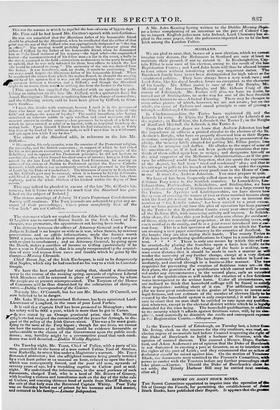SCOTLAND.
We are glad to near, that, in case of a new election, which we cosset imagine very distant, the Reformers in Scotland are sure at httto maintain their ground, if not to extend it. In Roxburghshire, Cap- tain Elliot is now sure of his election, owing to the result of the bile Registration Courts ; and Lord John Scott will thus be allowed lame to hunt otters without interfering with any important duties. nu Buceletich family have -never been distinguished for high talent carrot enlightened polities. They have always been a very weak race; ail Lord John, like his ducal brother, forms no exception to the chatagier of his tinnily. Mr. Ellice junior is sure of the Fife Burghs, Me. Macleod of the Inverness Burghs, and Mr. Gibson Craig of the county of Edinburgh. Mr. Forbes will also, we have no doubt,lbe turned out of Stirlingshire, to make way fur one of the best Soutisk statesmen known to us—Admiral Fleming. There may be changes is some other places, of which, however, we are not aware; but oa she whole, the cause of Reform and sound principle is sure of gaining& tritumph.—Edinterrvh Chronicle. In Clackmannanshire, the Tories have registered 23, and die Liberals 14 votes. In Elgin, the Tories put 2, and the Liberals 6 as the register ; in Banff-hire, the Liberals 9, the Tories 7 ; iu the Beg* of Banff and Maedulf, the Liberals .5, the Tories 1.
From the Glosyt w Argus we learn that Andrew Johnston has leg the impudence to address a printed circular to the electors of tI.e .Andrew's Burghs, who have so properly disowned him as their Repre- sentative, complaining of, and falsely attributing to preconcerted dn. felicity, the !measure lately adopted for putting Mr. Ellice junior, ism the seat he occupies and defiles. lie alludes to the anger of sone ad constitte tit:, as if it had not been perfectly notorious that tare- thirds of them called upon him to resign ; and designates himself as the tried supporter of the Melbourne Administration,—as if the per- SUNS lie addressed could have forgotten, that (to quote the expreasion of the Argus), he had been " tried and condemned" also; and that ie his attempt to palliate his breach of faith, he shrank under tbe expres- sion of unmitigated scorn from every gentleman in the House of Cann- m. is. It won't (hi, Andrew Johnston. You must prepare to quit.
We have of late been frequently called upon to note the propene fictitious Tory votes in the Scottish counties. In Lanarkshire, Big lithgow•shrire, Pecblesshire, Selkirkshire, and Stirlingshire, we base ',roved the manufactory of fictitious life-rent votes to a large evenly the Tories. In Ayrshire and Linlithgowshire, we have shown how the sy-tern of entering the moues of two or three nominal tenants along with the bond fide tenant in faun-leases, with a view to increase elm number of " the 1.,,ird's voters," has been carried to a great cstest. And we have pointed out how this plan of operation has been puestsei by the Tories in the Registration Courts every year siatTobt.passiig of the Reform Bill, with increasing activity and success. In Selkisk- shire alone, the Tories this year lodged sixty-nine claims fire erwdawart: of these, sixty-two are lift-rent proprietors ; of the remaining sems,emly one is resident iv the county, and he is a joint tenant introduced into a cur- rent lease. This is a fair specimen of the manner in which the Tories are creating a new paper constituency in the counties of Scotland. 161 the burghs they are also trying their hands. The county Tories in Fife have been purchasing qualifications in Cupar to a considerable es- tent. • * • • There is only one means by which tins evil rata be averted—by placing the franchise upon a basis less liable tampered with. And when the change of the basis is making., awn- mon sense dictates that it should be made in such a manner as sail render the necessity of any further change, except at a very distant period, extremely unlikely. The business must be taken in hand im- mediately, and carried through in a business-like manner. The two requisites for preventing the creation of fictitious votes ate—is the first place, the provision of a qualification which cannot well be nnaii- nal under any circumstances ; in the second place, such an extended basis of the qualification as will render the creation of a few fictitious votes incompetent to do serious harm. Under all circumstarreesom are inclined to think that household suffrage will be found to sail* these requisites : nothing short of it can. For additional semi% (for we have great confidence in the genius of lawyers to invent sew legal fictions, and our estimate of the number of electors likely to be created by the household system is only conjectural,) it will be awes. sary to enact that no man shall be entitled to vote upon any qualifica- tion whatever, except in the electoral district within which he is leg* domiciled for the time being. The household qualification, in adibilea to the security which it affords against fictitious votes, will,.bries sim- plicity, tend materially to diminish the cavils and consequent expense in the Registration Courts.—Glasgow Argus.


























 Previous page
Previous page